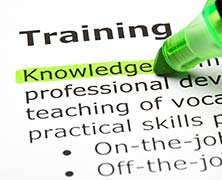Training TA and Other Resources
NIDILRR grantees can receive free technical assistance through one of the KT centers. Also, workshops and annual conferences provide a great opportunity to network, stimulate new ideas, and improve your knowledge translation activities.
The Center on Knowledge Translation for Employment Research (CeKTER)
is funded by National Institute on Disability, Independent Living, and Rehabilitation Research (NIDILRR) and our goal is to generate new materials
and methods for greater utilization of knowledge translation in services and policies to successfully promote employment outcomes for people with
disabilities. CeKTER is co-located in the
Boston University Center for Psychiatric Rehabilitation (BU CPR)
and the Implementation Science and Practice Advances Research Center (iSPARC)
at the University of Massachusetts Medical School.
ADA Network KT Center
The ADA Knowledge Translation Center (ADAKTC) functions as a platform for knowledge translation on topics related to the ADA. It does this by working to accomplish the following three goals:
- Optimize efficiency and impact of the ADA National Network's (ADANN) activities,
- Increase awareness and use of ADA research findings to inform behavior, practices, or policies, and
- Improve understanding of ADA stakeholders' need for and receipt of ADA Network Services.
Initiative to Mobilize Partnerships for successful Assistive teChnology Transfer (IMPACT)
This project addresses the barriers, facilities, and factors associated with assistive technologies (ATs), and successful AT technology transfer (ATTT).
Model Systems KT Center (MSKTC)
The Model Systems Knowledge Translation Center (MSKTC) summarizes research, identifies health information needs, and develops information resources to support the Model Systems programs in meeting the needs of individuals with traumatic brain injury (TBI), spinal cord injury (SCI), and burn injury.
KTDRR Center
The Center on Knowledge Translation for Disability and Rehabilitation Research (KTDRR) makes it easier to find, understand, and use the results of research that can make a positive impact on the lives of people with disabilities. Knowledge translation (KT) refers to strategies that move research into practice by improving the relevance, reporting, accessibility, interpretation, and application of research results. The KTDRR Center focuses on KT activities to support researchers in the disability and rehabilitation field.

